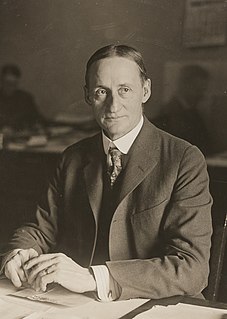A Quote by Mary Parker Follett
I wish we could understand the word expert as expressing an attitude of mind which we can all acquire rather than the collecting of information by a special caste. ... Many of us are calling for experts because, acutely conscious of the mess we are in, we want someone to pull us out.
Related Quotes
What I've learned about teaching is to refer back to the root of that word, which is educo, which means "to pull from." Education does not mean jamming information into somebody's head. Rather, it's that ancient idea that all knowledge is within us; to teach is to help somebody pull it out of themselves.
One can think of a secretary actively operating a filing system, of a librarian actively cataloguing books, of a computer actively sorting out information. The mind however does not actively sort out information. The information sorts itself out and organises itself into patterns. The mind is passive. The mind only provides an opportunity for the information to behave in this way. The mind provides a special environment in which information can become self-organising. This special environment is a memory surface with special characteristics.
Are there experts, ethical experts, that's very offensive to all of us? Because it's part of our humanity to have a stake in these questions to feel that we ourselves know the difference between right and wrong. And then along come these experts, philosophers, claiming, you know, an expertise, a special training, a special skill, a special talent.
The fear side can have us pull away and protect us, but it's really a withdrawal, a disassociation, a cutting off. Rather than the word detachment, I usually use the word non-attachment. That can be wholesome when we care and are completely engaged with each other but are not attached to things being a certain way.
Usually, if we hate, it is the shadow of the person that we hate, rather than the substance. We may hate a person because he reminds us of someone we feared and disliked when younger; or because we see in him some gross caricature of what we find repugnant in ourself; or because he symbolizes an attitude that seems to threaten us.
There is always in the healthy mind an obscure prompting that religion teaches us rather to dig than to climb; that if we could once understand the common clay of earth we should understand everything. Similarly, we have the sentiment that if we could destroy custom at a blow and see the stars as a child sees them, we should need no other apocalypse. This is the great truth which has always lain at the back of baby-worship, and which will support it to the end.
We don't exist unless there is someone who can see us existing, what we say has no meaning until someone can understand, while to be surrounded by friends is constantly to have our identity confirmed; their knowledge and care for us have the power to pull us from our numbness. In small comments, many of them teasing, they reveal they know our foibles and except them and so, in turn, accept that we have a place in the world.
As I’ve said, I’ve never believed in God, which technically makes me an atheist (since the prefix “a” means “not” or “without”). But I have problems with the word “atheism.” It defines what someone is not rather than what someone is. It would be like calling me an a-instrumentalist for Bad Religion rather than the band’s singer. Defining yourself as against something says very little about what you are for.
A grateful heart, then, comes through expressing gratitude to our Heavenly Father for His blessings and to those around us for all that they bring into our lives. This requires conscious effort-at least until we have truly learned and cultivated an attitude of gratitude. Often we feel grateful and intend to express our thanks but forget to do so or just don't get around to it. Someone has said that "feeling gratitude and not expressing it is like wrapping a present and not giving it."
Feminism is nothing but equality, and actually, feminism benefits men because it liberates us and it releases us from many stigmas imposed by the macho culture on us as well. So if more of us could understand that it's nothing but equality, I think many agendas in terms of equality would have advanced quicker because it really helps us as well.
The art of loving creates the unity which has unlimited spiritual strength, and that is the greatest need in the world today, and each and every one of us can make such a difference if we become humble, if we develop a service attitude rather than an exploitative attitude, if we develop the broad mind to see the oneness and to learn to love all living beings.

































